During these challenging times, as we all try to adapt to a new normal, keeping ourselves and our loved ones safe and well is at the top of everyone’s priority list, especially if yourself or a loved one is living with dementia.
Although the challenges social distancing brings for those with a dementia are wide-reaching and as varied as the disease itself, so are the inventive solutions many of us are using to cope with the current situation.
We’ve brought together a number of examples of the ways people across Greater Manchester are finding to live well in lockdown. We hope that until things return to normal, and they will, you may be able to take some inspiration from their stories.
Dale and Roger’s Story
Dale has always liked animals and they still stimulate her interest. This can be birds and animals in the garden (we have seen over thirty species of birds over the years), birds seen on local walks (she is physically fit and not shielded), which include herons and family and friends’ pets, largely viewed on video calls but some dogs seen in the flesh, with appropriate human social distancing.
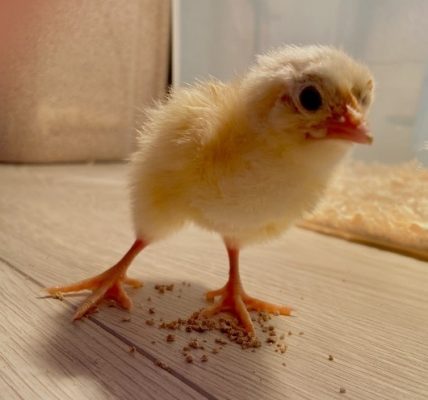
I am putting together a photographic still collection of these, including six dogs (two seen virtually and in the flesh and one neighbour’s dog) and five cats (the photos can be seen here). The photo above is the most unusual of the twelve, Lucky the Chick. Dale does not talk much often laughs when she sees familiar pets. However, when she saw Lucky she did say “Lovely.”
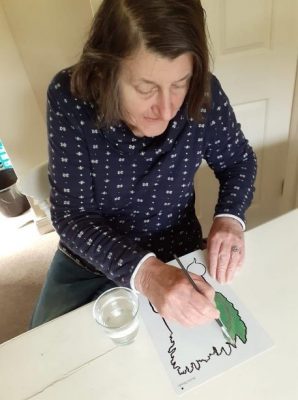
What’s helped us during lockdown:
- Video calls with friends and family (particularly ones with pets)
- Music and nature videos on YouTube on big TV screen
- Joking and laughing
For himself, as a carer, Roger adds that he finds long Zoom meetings (for example with TIDE and the L4DC steering group work), participating in research and taking time for himself (early mornings and late evening) has been helping him to keep busy during lockdown.
John’s Story
Because of my health I together with my wife am subject of the 12 week shielding programme. During the first week we were bombarded with telephone calls and letters from official organisations advising us what we can’t do but little about what we can.
My Wife has hobbies and functions fully. Therefore confinement has been less difficult for her than it has been for me, Because of my dementia I can no longer read a newspaper never mind a book. I do not watch television or films as I cannot follow plots.
This has been quite depressing as since my diagnosis I participate in many things with different organisations. Because of this I developed a sense of being in control of my dementia and my dementia did not control me.
Psychologically I had returned to the beginning of my dementia journey. I could not allow this to continue, I had to regain control. I had to lift my mood, take stock, recognise that I wasn’t alone and that there was many things I could do.
So what are these things? Firstly I have Freddy and Penny, 2 Shi Tzu Dogs. I decided to utilize my time in teaching them some tricks. Unfortunately they were totally uncooperative and I feel that the only thing I have achieved is that have I taught them to ignore me.

I have at this stage got to thank the many colleagues who have contacted me and in doing so have restored my sense of purpose. Indeed I consider them also as good friends. Because of regular communication I have found myself enabled to continue my work via the marvel of Information technology.
I attend virtual meetings where I continue enthusiastically to contribute, I continue with my writing and have even began to write poetry:-
Dementia is a squatter that lives within my head
It cannot be evicted remaining there instead
I have no other option to accept it’s here to stay
But whilst I have capacity it will be kept at bay.
I am heavily involved in research and continue to work with Dementia United and the Alzheimer’s Society to name but two.
In conclusion I no longer look out of my window staring at people walking past jealously wishing I could do that. I glance out of my window and think ‘That’s enough I have work to do.’
Joy’s Story
I feel very fortunate to have a garden, and during this lockdown I’ve spent hours and hours outside. So you’d think that the flower beds would be weed free and the lawn immaculate, NOPE!
I set to with a project. My granddaughters have their own fairy garden, so I went into my small child mode and have been designing a fairy garden for myself. Being on benefits, I couldn’t spend a fortune, so I improvised. I went in search of useful items that were laying around. Clay pots incorporated into a waterfall and stream, a little wooden bridge that my husband constructed out of random bits of wood. I found some bottle lights that were left over from a dementia support group project and these got secured to the bridge.It’s amazing what you can recycle.
I imagined this project would keep me occupied for a few days, but 6 weeks on I’m still expanding and improving on the original plan. For me it’s been a lifesaver, OK, so I’ve forgotten where I’ve left the trowel and tripped over the hose numerous times, but just being outside and being creative has given me something to get out of bed for. I can’t wait for when my grandchildren are allowed to visit, they will compare it to their fairy garden and no doubt say theirs is the best.
But for me, it hasn’t been about architectural design. No, it’s been about using my imagination to escape into a tranquil place. I do look out of the window every evening in hope that the fairies will visit my garden, but as yet there’s no sign. I’m thinking of putting up a notice… This garden is corona free!
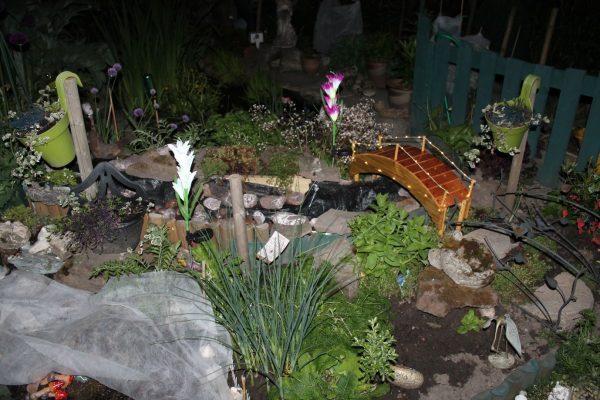
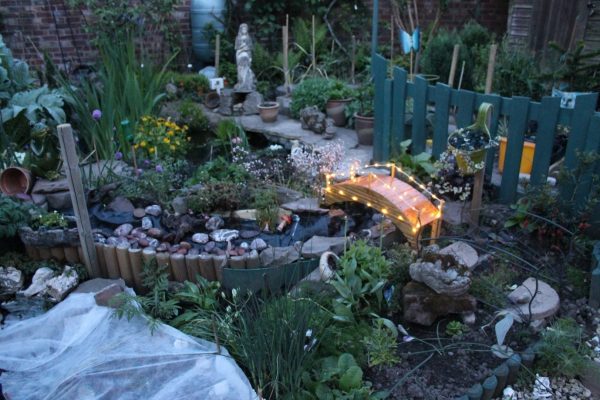
Ken, Linda and Hetties’ Story
My husband Ken is 57 and was diagnosed with young onset Alzheimer’s four years ago.
When our golden retriever died after fourteen years we vowed never to have another dog, and we didn’t for twelve months, but then I began to think a dog in our lives would be a good thing. Ken’s speech is poor. It took Ken a long time to take to Hettie, she was a completely different character, independent, stubborn even, small and scruffy.
But she has melted his heart, is tuned into his anxieties and three years on is a constant companion.
She doesn’t judge, he doesn’t need to explain, they seem to just understand. Since lockdown she has certainly gone up the pecking order with no competition from the grandkids and without her there would be far less laughter in our house.
She’s the excuse for our permitted exercise, and general entertainment playing in the garden.
Scruffier than ever but with a heart of gold.
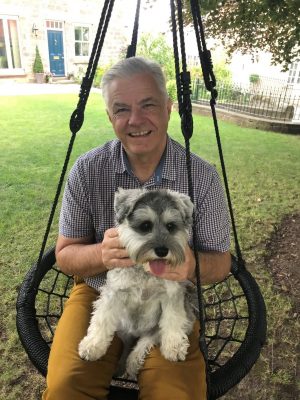
Mavis and Maz’s Story
Before Covid-19 my mum and I would shop together, walk in parks, visit coffee shops, amusement arcades, meet up with other family members, and anywhere there is a little interaction going on.
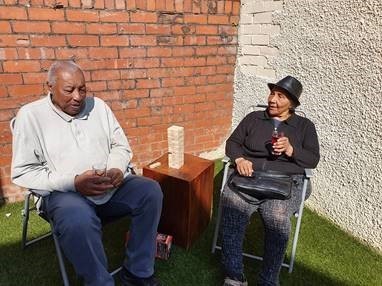
Today we’re limited to a short walk around the block. Parks are out, as mum has to stop and rest, shopping is a non-starter because of crowds and queues, we have no cafes, or coffee shops to break up the day and no family can come around.
But, luckily the weather has been a good, and we’ve kept mum active as much as possible.
- She loves her music & we have dance off competitions (good exercise).
- We play various board games, including Jenga.
- WhatsApp has been a life saver. Mum doesn’t do well with phone calls, but loves video chats.
- YouTube also helps as we can usually find a lot of comedy, films and music she remembers.
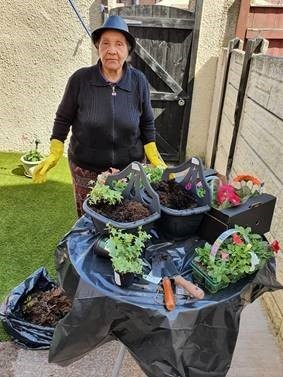
Patrick’s Story
I’m Patrick, 36 years old and living with frontal lobe atrophy.

I love alone, single, from the LGBT community and my lockdown wasn’t best from the beginning. To be honest, I’ve taken some time to handle the situation, as I really didn’t feel I could help anyone else until I knew how to help myself . So, one morning I woke up and started to listen to one of the voices in my head and started to think how I could manage being away from my family, whom I only see once a year and now I don’t know when, my support worker, my support network, my friends, work etc.
Gosh the task seemed difficult but in the end I started off walking. I have never walked around the city alone but, bit by bit, I mapped a route to take and stuck to it. I took my time and stopped to enjoy placed I had never seen before. I walk along the canals, where I know now and I have my favourite little park where I sit on the bench in the morning listening to the birds. I also do my little prayers on the steps of Manchester cathedral every day. While walking I found ways to help cope with my anxiety.

I always used to say that structure was important for people with dementia but now I realise that life could change at any time and force those structures to change; the only way I can adapt is by doing things differently. I became more comfortable with myself and more able to relax. I learned to use deep breathing exercises every day as a form of meditation and a time to stop and appreciate all I have.
Pen and paper became my friends once again, I wrote for ages. Writing helped me structure my feelings, thoughts and keep on top of things I needed to do. Even though my memory isn’t too good at the moment and I’m forgetting how to communicate with people on a social level, I’m learning how to deal with myself and accept my condition in a way I really couldn’t before.
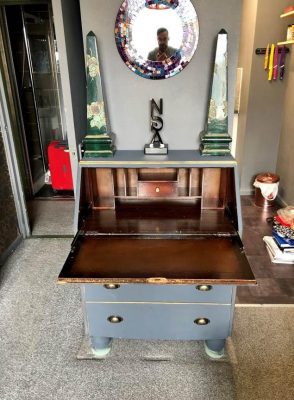
I live alone with dementia and am frightened but I can wake up tomorrow, walk around my beautiful city and this to me is how I’ve managed my lock down. I walk to survive.
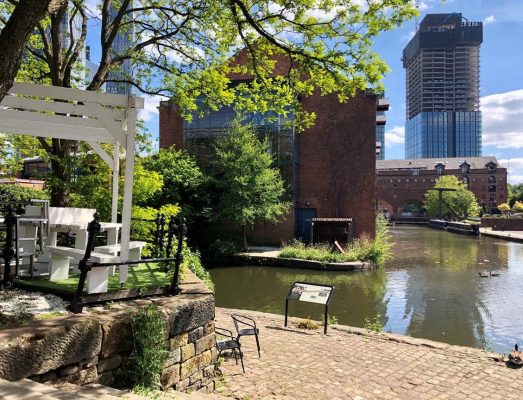
I also started remodelling my flat and buying the things I really need, I finally got a desk similar to one my mother had as a child, and every time I sit at it I remember her and me as a kid. I also make a point of being silly and joking around, because if you don’t find time to laugh each day, all of this will seem harder.
Dementia takes too much away from us but the one thing I truly believe is that everybody knows how to laugh, and that’s magic by itself. If you can do it each day the pain really does go away.
We would like to thank everyone who shared their stories with us to help create this post. We’ve certainly been inspired and moved by your words, reading everyone’s stories helps us all feel a little more together even when we are apart.
